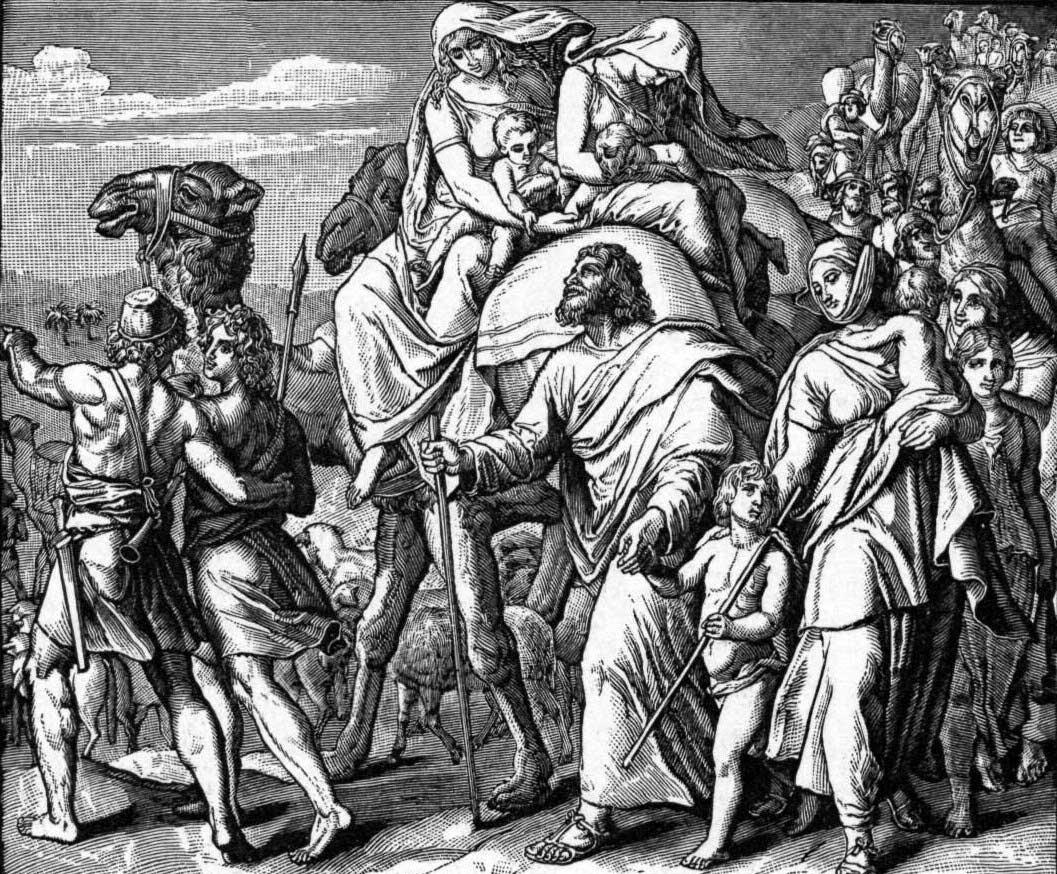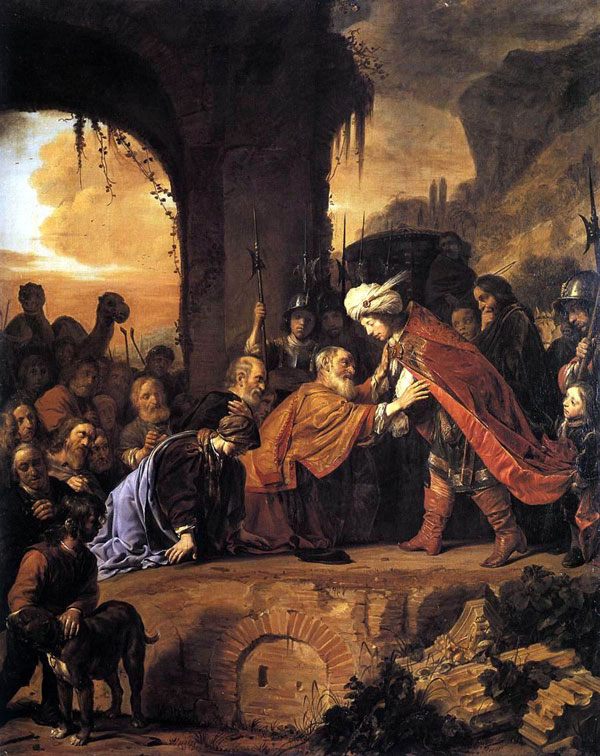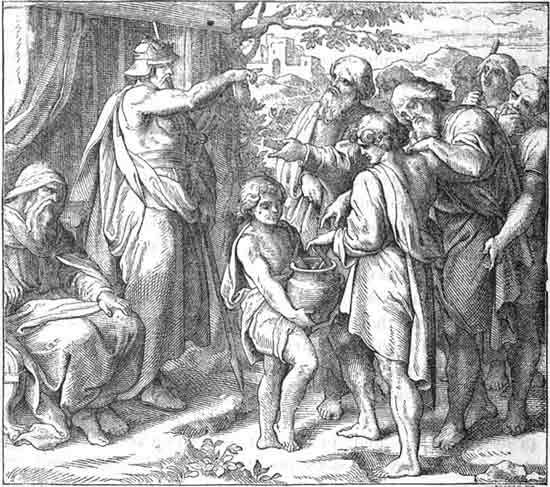
Having crossed the Jordan, the Israelites had camped at Gilgal. It was here that Joshua had, along with the memorial of the Twelve Stones, also got the Tabernacle temporarily erected, the Tabernacle that served to remind the Israelites of God’s constant companionship throughout the time they wandered the desert. It was to be here for the next seven years, i.e. till such time as the Israelites seized control of the entire region of Canaan.
Joshua entered Canaan and to begin with decided to attack the city of Jericho, the city where the scouts he had sent, had lived. It was a heavily reinforced and a fortified city. The Jews laid siege to Canaan from all sides. While they mulled over ways in which they could crack the fortification of Canaan, God Himself provided the answer. He said, ‘Have the priests carrying the ‘Ark of the Covenant’, horning the trumpets and being guarded by Israelite soldiers at their front and back, march around the city circling it once for six days. On the seventh day, repeat this for seven times. When you hear them sound a long blast on the trumpets, have the whole army give a loud shout’. On performing the ritual for seven days, exactly as per the divine instructions, a miracle happened. The walls of the city automatically crumbled and gave way. All hurdles done away with, nothing could now prevent the Jewish army from entering the city, so says the story.

Storming into the city, the Jewish forces slayed the local king, his army and all others, who opposed the Israelites, sparing of course, Rahab and her house, in keeping with the promise given by the two Israelite scouts of Joshua. This marked the first victory of the Jews after setting foot on the land of Canaan.
However, Joshua issued strict orders that all valuables seized by Israelites while taking control of the city, were to be deposited in the central treasury. But an Israelite named ‘Achan’ fell prey to temptation and stealthily hid some gold, silver and costly cloth. Though the sin did not come to light immediately, God definitely did not approve of it and the Jews had to bear the brunt of God’s disfavour, so says the story.
After winning Jericho, the Jews headed towards the city of Ai. Like Jericho, Ai too was a heavily reinforced and a fortified city. But on learning from his spies that conquering Ai was not as tough a proposition as conquering Jericho was, Joshua sent a limited contingent of about 3 thousand troops to conquer Ai. But the result went contrary to the intelligence that Joshua had received. The army of Ai thrashed the Israelite contingent; moreover thirty six Israelites soldiers fell at the hands of the enemy.
At that, God told Joshua that the defeat was a punishment meted out to the Jews for the dishonesty of one of them. Wild at the deceit, Joshua decided to thoroughly investigate the matter. With God’s help and by casting lots, Joshua identified Achan. After Achan confessed to his crime and returned the things which he had stolen, he was killed.
Later, with a larger contingent and better confidence Joshua set out to attack Ai. The Israelites now had a changed war plan in place and accordingly their forces took up positions on either side of the city of Ai. The battle began with one of the flanks of the Israelite army attacking to which the Ai army responded. After giving a fight for some time the fighting flank of the Jewish army began to pull back feigning withdrawal from the battlefield. Their zeal receiving a boost, the troops of Ai started to follow the retreating Israelites. They kept moving farther from their borders and there came a time when they found themselves considerably far from their kingdom. At a pre-decided moment and on receiving the signal as planned, the other half of Joshua’s army contingent attacked Ai from behind and attacked Ai’s troops. The king of Ai and his troops were made to bite the dust. The Israelites had gained control over another territory of significance.

After the battle of Ai, a delegation of people came to meet Joshua. They appeared tired and their clothes too were worn out. They told Joshua that they had travelled a long distance in the hope of a peace treaty and with the intention of extending a hand of friendship with Israel. Granting them mercy, Joshua entered into a peace treaty with them. But it was after they left that Joshua learnt that they belonged to Gibeon, a neighbour of Ai. They had approached Joshua as they dreaded the attack of the Israelites. Joshua decided to keep his word in any case.
Enraged that Jericho and Ai had fallen to the Israelites and that Gibeon had entered into a peace accord with Israel, the kings of some of the Canaanite kingdoms united under the leadership of the King of Jerusalem and invaded Gibeon. Gibeon pleaded for Israel’s help as per the provisions of their peace treaty. Joshua kept his word; taking along some of his select troops he travelled the whole night and reached Gibeon by dawn. Joshua’s troops now launched an all-out surprise offensive on the enemy that was, until then totally oblivious and unsuspecting. The war was fought through the day. The same day saw hailstones raining on the enemy army, so says the story. It meant that God was once again helping the Israelites in their battle against the Canaanite forces. But the story also talks about the occurrence of yet another miracle. The day of the battle happened to be a Friday. Though the Jews were gradually gaining grip over the battle the end was nowhere in sight. Joshua feared that the battle would spill over into the time of Sabbath (the sunset of Friday). As he continued with the battle, a concerned Joshua prayed to God for mercy. And a miracle happened…. the sun did not set for the next 24 hours; the sun did set but only after the Israelites had secured a complete victory and had fully decimated the enemy…. The Jews peacefully observed Sabbath after the victory, so says the story.

Joshua’s forces had defeated 31 Canaanite kings in all and had conquered their kingdoms during this campaign.
For the next seven years the Israelites faced invasions from several enemy kings and their battles continued. The Jews kept winning every battle one after the other and went on annexing more and more of the Canaanite land – the ‘Promised Land’.
At the end of the seven years though a sizeable part of Canaan was under Joshua’s control, a considerable territory still remained to be conquered. It was now time for him to arrive at a decision about proportioning it and allocating it with a view to assigning its governance to the ‘Twelve Tribes of Israel’. From among the Twelve Tribes which happened to own the largest of the flocks, Moses had already granted to the tribes of Reuben and Gad the Amorite kingdom and the kingdom of Bashan that had vast green meadows. The warrior men of these tribes did indeed keep the word they had given to Moses. They did fight shoulder to shoulder with all the Israelites and had not set foot on that land. Joshua was therefore only too happy to permit them to go back to the granted lands.
But Joshua also clarified that the division of land was only for administrative convenience and that all the Israelites and the whole land of Canaan were one nation, the nation of Israel. Joshua also established a system of communication between the Israelite divisions with the central leadership.
After immense strife and toiling that spanned centuries, the Israelites had settled in the land of Canaan, their ‘Promised Land’. God had thus fulfilled his promise that He had made to the first of the Patriarch of the Israelites, Abraham and his descendants through visions, about six or seven centuries earlier.
The story is considered to date back to the 13th century before Christ. (To be continued…)












